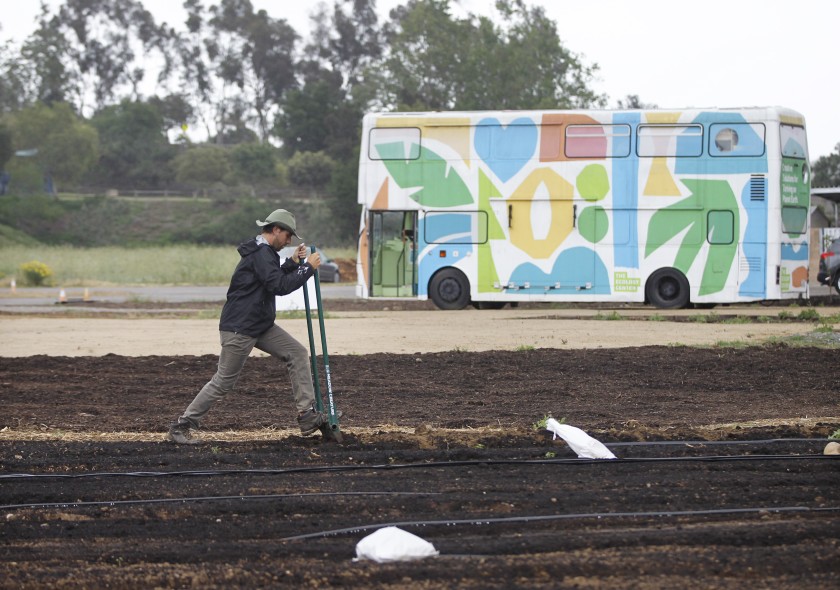
Photo from the San Diego Union Tribune
By Caron Golden
On Saturday, June 8, chefs, farmers and community members will gather at Encinitas’ Farm Lab for its first “Green Feast.” It’s to be a celebratory meal to raise funds for this unique agricultural laboratory that educates local kids in science centered around nutrition and the environment.
The Farm Lab is a project of the Encinitas Unified School District in collaboration with The Ecology Center, which is based in San Juan Capistrano. Located across the street from the San Diego Botanical Garden and the Leichtag Foundation’s Coastal Roots Farm — with whom they partner, along with the local YMCA, the San Diego Heritage Museum and Seacrest Village as part of the Encinitas Environmental Education Cluster (known as the E3 Cluster).
The Farm Lab serves the district’s 5,400 kindergarten-through-sixth-grade students on its 10-acre campus. It’s filled with all kinds of enrichments to motivate children to expand their minds and get their hands dirty while doing it.
There’s an educational DREAMS campus (which stands for design, research, engineering, art, math and science) with six classrooms, including a space for a kitchen and audio-video work, as well as a 1-acre hands-on educational garden, 4 acres of fields that grow crops for “farm-to-school” EUSD school lunches, and a 3/4-acre community garden. A decked-out “eco bus” is parked by the fields. Three educators are on site.
The campus only broke ground in April 2018, so trees — avocado, lemon, peaches, plums, oranges, apples and more — are just being planted. Eventually there will be more than 200 fruit trees and fields brimming with crops. In conjunction with The Ecology Center, 19,000 pounds of produce was grown last year for the schools for pizza sauce, salads and other dishes. In Encinitas, farm manager Carter Wallace has been hard at work tilling soil that for years had been a dumping ground for nearby construction. Hard and lacking in nutrients, much of the farmland has been sown with rye, daikon, fava beans and vetch as cover crops. Wallace calls it a “nitrogen fixer.” And the plants don’t go unused. The Ecology Center is working with Rye Works to harvest the rye. The daikon produces tasty “daikon capers,” or pods that can be enjoyed by the students. And, of course, fava beans make for a nice edible harvest.
While those cover crops do their work, Wallace has been planting tomatoes in the north section of the farm and will soon be putting in peppers, lettuce and cucumbers. There will also be a couple of chicken coops. Wallace and Jonathan Zaidman of The Ecology Center collaborate with EUSD’s central kitchen chef to determine what’s grown.
The Farm Lab was the idea of Encinitas resident Mim Michelove, CEO and President of Healthy Day Partners. The site had been donated to EUSD as part of a mitigation deal for constructing the Encinitas Ranch housing development. It needed to be turned into a school campus or it would start accruing annual penalty fees to the state. The school district didn’t need another school, so they came up with a creative idea for a campus that would preserve some of Encinitas’ remaining open land and still be an educational site for its students.
Using Healthy Day’s 1-acre educational farm at Ocean Knoll as a model, EUSD asked Michelove to come up with a plan for the site that would scale up the successful concepts at Ocean Knoll. But bringing it to life required a director and budget — especially if it was to be eligible for outside funding.
In July 2015, the school board appointed Michelove as its founding director and gave her a $50,000 initial budget to build and redesign the campus, create the farm, bring in community partners and funding partners, coordinate large volunteer workdays, oversee the lease with the community garden and the neighborhood relationships, as well as help to rethink the educational programming, facility and the fields. She started communicating with The Ecology Center with the idea of eventually bringing them in as a partner.
“I took on the challenge, and added a community food forest and communications role,” Michelove said. “I had a clear vision from the start, to build a more inviting campus where all students would feel valued, to convey environmental messaging in everything the students used and saw, to grow as much healthy food as possible for all EUSD kids, to have the programming use the outdoors as an experiential teacher, and to have the programming, at least in part, reflect the environmental and nutritional values being used in our farming practices.”
Superintendent Tim Baird named the education campus DREAMS. Children from every grade level come and take on projects aligned with Next Generation Science Standards. On a recent visit, fourth-graders were working on a from-scratch miniature wind turbine project. Julie Burton, Coordinator of Innovation and Farm Lab Development for the EUSD, who has been running the campus since Michelove stepped down last year to return to her business, explained that second-graders are learning about the relationship between pollinators and sustainability of food sources. Sixth-graders have a longer-term competition with Jimbo’s to make organic vinaigrette, and also learn packaging, logo, branding and label creation as part of the project, along with integrating a range of subjects, including math, nutrition, drought and even desalination.
For Burton the various components of the campus are teaching students — and the surrounding community — “how to minimize their footprint, how to live a more sustainable life, and reuse, reduce and repurpose.”
In fact, including the community in the Farm Lab is a top priority for Burton and the EUSD. There’s the community garden and a Community Food Forest that stretches along Quail Gardens Road. And The Ecology Lab hosts regular community events at the Farm Lab campus, with weekly volunteer days and a Community Dinner Series.


